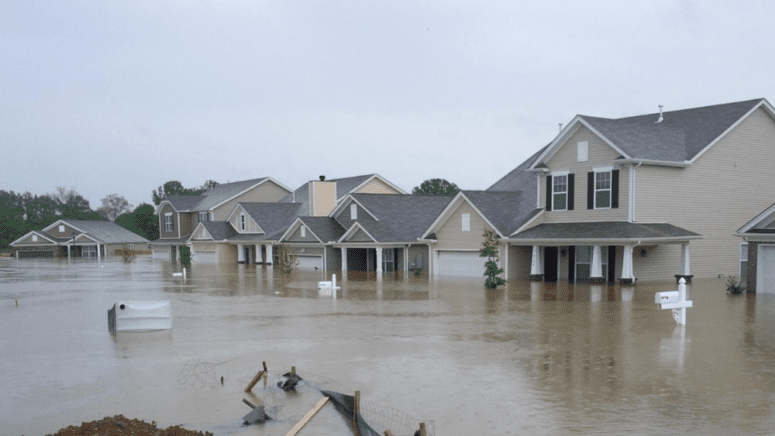A Homeowners Guide To Selling a House With Water Damage
- Published on
- 8 min read
-
 Stacy Sare Cohen, Contributing AuthorClose
Stacy Sare Cohen, Contributing AuthorClose Stacy Sare Cohen Contributing Author
Stacy Sare Cohen Contributing AuthorStacy Sare Cohen is a seasoned content writer with a passion for real estate, home design, decor, and home improvement. She holds a B.A. in English from UCLA and has been published in Apartment Therapy, Angi, HomeAdvisor, and elsewhere. When Stacy’s not creating content, she’s dreaming up new project ideas for her newly remodeled condo.
-
 Fran Metz, Contributing EditorClose
Fran Metz, Contributing EditorClose Fran Metz Contributing Editor
Fran Metz Contributing EditorFran Metz is a freelance content writer, editor, blogger and traveler based in Las Vegas, Nevada. She has seven years of experience in print journalism, working at newspapers from coast to coast. She has a BA in Mass Communications from Fort Lewis College in Durango, Colorado, and lived in Arvada for 15 years, where she gained her experience with the ever-changing real estate market. In her free time, she enjoys 4-wheeling, fishing, and creating digital art.
Water damage accounts for 24% of annual home insurance claims, according to Forbes Advisor. Whether the source of the issue is a leaky pipe or a flood caused by a storm surge, selling a home with water damage can affect your home sale. Often, water damage isn’t detected until a home inspection.
Top-performing real estate agent Christy Friesen of Wichita, Kansas, recalls a time when her client learned their home had severe water damage after a buyer’s home inspection.
“I had a case where an inspector in the crawlspace discovered that the water line in the back of the refrigerator had been leaking — possibly for months,” she explains. “Some of the beams and the floorboards had to be redone.”
Selling a house with water damage can significantly affect your home sale. But with preventive guidance, sellers can avoid a crisis that can potentially cost thousands of dollars.
Common causes of household water damage
During a home inspection, an inspector will assess the condition of a home, looking for safety issues and health hazards such as water damage that can cause the growth of black mold. Many home inspections also check for corroded and rusty pipes, which can also lead to leaks and water damage. Before you put your house on the market, make sure to check your home for the most common sources of water damage:
- Rusted and leaky pipes
- Leaking faucets and toilets
- Water sewer issues
- Backflow and cross-connection problems
Leaking pipes
Many issues can contribute to leaking pipes such as age, freezing, corrosion, and rust, which can affect your sale. Another cause of leaking pipes is improper pH balance levels in your water, which can dissolve the copper in pipes. The proper pH balance should be 6.5 to 8.5 for drinking water. Acidic water too low or alkaline too high can be unsafe to drink.
Prevention tip: Look for discolored water and low water pressure. Other signs that indicate leaking pipes include:
- Water stains on your ceilings
- Bubbling and peeling paint on walls
- Cracks in the floor
If you discover any of these signs, contact a plumber.
Flat roofs
Flat roofs are designed with a gentle slope to facilitate water drainage into gutters. Nonetheless, the accumulation of debris, tree limbs, and ice dams can lead to water pooling on roofs. Ice dams specifically obstruct the natural runoff of water from the roof, potentially resulting in roof cracking, ceiling leaks, and mold growth.
Prevention tip: If you have a flat roof, inspect your roof and remove any debris that could block the flow of water. You can also hire a licensed roofing contractor to repitch the roof.
Clogged gutters
Clogged gutters are another issue that can cause water damage, especially when they’re not properly maintained. Falling leaves, debris, and even small pests can get stuck in gutters, causing the water to overflow down the side of your home, instead of through your gutter system. This can cause water to shift the foundation, ruin landscaping, and flood your basement.
Prevention tip: Always maintain gutters. They should be cleaned at least twice a year, once at the end of autumn after the leaves fall, and again in winter. If you have a lot of trees on your property, consider gutter cleaning three times a year. You can clean them on your own if you’re comfortable climbing a ladder, or you can hire a gutter-cleaning professional.
Floods from storm surges
While storm surges and hurricanes are natural disasters and can’t be avoided, FEMA says homeowners can take measures to minimize water from entering homes by:
- Recaulking windows and door frames
- Sealing cracks and gaps
- Installing storm shutters and high-impact glass on windows
- Reinforcing your garage door
- Using flood-resistant drywall, insulation, and tile floors
- Storing appliances, contents, and important documents above the base flood elevation (BFE) level, the height that floodwater is likely to rise.
To find your BFE, you can look it up on the National Flood Hazard Layer database.
Carry the proper home insurance coverage
According to Consumer Affairs, insurance companies pay out $13 billion dollars each year for water damage claims, with the average household claim costing about $12,514. This number doesn’t include homeowners whose damage wasn’t covered and needed to pay for water damage out of pocket.
Types of water damage covered by home insurance
The types of water damage covered by a standard insurance policy include the following incidents:
- Sudden or accidental discharge
- Overflow
- Water or sewer backup
Damage from storms necessitates flood insurance and is generally excluded from standard home insurance policies.
Additionally, most insurance companies won’t cover water damage related to wear and tear such as a gradually leaking pipe that’s been dripping slowly for a month.
According to Allstate Insurance Company, two components of a standard homeowners policy that can assist homeowners with accidents or sudden water damage are dwelling coverage and personal property coverage. But that doesn’t cover flood insurance, which must be purchased separately.
Home Inspection Insider offers the following claim filing tips for homeowners dealing with water damage:
- Notify your insurance company immediately
- Document the damage by taking photos and videos
- Mitigate further damage
- Keep a detailed inventory of damaged items
- Keep receipts and records of your conversations with your insurance adjuster
Remediating the effects of water damage
Bart Tipton, a top-selling Bakersfield, California, real estate agent who’s facilitated over 1,300 transactions to date, says that water damage can be an inconvenient and costly problem that can arise during a home sale.
“They can take down the sheetrock as much as three feet in the walls, clear out all the insulation,” Tipton says. “It’s expensive; most of the time the insurance will pay for it, but it’s extremely inconvenient.”
Remediation is essential if you discover mold, Tipton says. “I’ve had people have leaks underneath a bathtub or something like that, that they found during the inspection, and they have a mold test done just to make sure there isn’t any mold.”
“And if it is, which I have had in the past, have a mold remediation company come out and do it,” Tipton says. “It does get expensive, [costing between] $4,000 to $7,000, but you really don’t have too much of a choice.”
Are you required to disclose a property’s water damage history to buyers?
It’s critical to disclose water damage to buyers when selling a home. If you don’t, you can end up in litigation. Real estate agents will provide a disclosures document that requires sellers to inform buyers about any known property issues. While disclosure laws vary from state to state, when in doubt, disclose. If you don’t disclose issues about the property, the buyer can sue you for the damage after the sale.
Mac Martinson, a real estate attorney in Huntsville, Alabama, says, “The seller could be liable — if they knew of the damage — as this is a health and safety issue, and the seller did not correct the problem.”
The biggest challenges of selling a home with water damage
Selling a house with water damage presents a variety of obstacles to sellers, such as the following issues:
- Reducing the price: If a buyer agrees to buy a property that has water damage, it’s understandable that they would seek to reduce their offer by deducting the remediation costs from the price.
- Health hazards: Any water issue in the home can pose health concerns for inhabitants, especially if there is mold present in the home.
- Safety concerns: If the water damage has affected the home’s electrical system, it can cause a security and safety risk, or even an electrical fire.
- Future water damage: A home located on the water or in a flood zone can be hit by future hurricanes and storms, which can cause potential flooding issues. Although buyers may know a home is located in a flood zone, they might use this as a negotiating tactic to reduce the price.
Tips for selling a house with water damage
Consider selling your house to a cash investor as-is
If you’re having trouble getting to the closing table, or would like to avoid the hassle of hiring restoration specialists and contractors to do assessments and repairs, consider selling your house as-is to a cash investor through HomeLight Simple Sale.
HomeLight’s platform has access to a network of pre-approved investors, including iBuyers, house flippers, and buy-and-hold investors. Simply enter your address and a few details about your property, and the platform will match you with an investor who can present you with a cash offer in as few as 24 hours and close in as few as 10 days.
Research mold remediation options
If you’d like to receive the best offer for your house, it’s best to foot the bill for the water reparation. If you hand off the task to the buyer, you might need to accept a much lower offer.
Repair the damage
If your house doesn’t need mold remediation and the damage is fairly minimal — such as moisture damage to furniture and a few walls — you might opt to repair the damage yourself. Another option is to ask your agent to recommend a contractor.
Provide evidence of remediation in writing
Your sales contract should clearly state the steps you’ve taken to mitigate the water damage. Make sure to collect receipts, invoices, and any documentation, including warranties, to present evidence to the buyer.
Speak to an experienced agent when selling a house with water damage
If you’re considering selling a house with water damage, speak to a qualified real estate agent. A seasoned agent can link you with their trusted network, including restoration specialists, contractors, and home inspectors, to coordinate a pre-listing inspection to assess any water damage before listing your home for sale.
Header Image Source (resized): (tsyhun / Flickr via Creative Commons Legal Code)
- "Does Homeowners Insurance Cover Water Damage From Rain Or A Leak?," Forbes, Jason Metz (October 2023)
- "A Guide on pH, Alkalinity, and their impact on Drinking Water Quality," The Perfect Water (July 2023)
- "Most Common Causes of Water Damage in the Home," Secure Restoration (December 2023)
- "Water damage insurance claims statistics," Consumer Affairs, Robby Brumberg (March 2024)
- "Does Homeowners Insurance Cover Water Damage?," U.S. News, Bob W. Phillips (February 2024)
- "Does homeowners insurance cover water damage?," Allstate (July 2023)
- "Flood Insurance: What It Is And What It Covers," Forbes, Les Masterson (October 2023)
- "10 Water Damage Insurance Claim Tips You Should Follow," Home Inspection Insider, Hubert Miles (February 2024)




